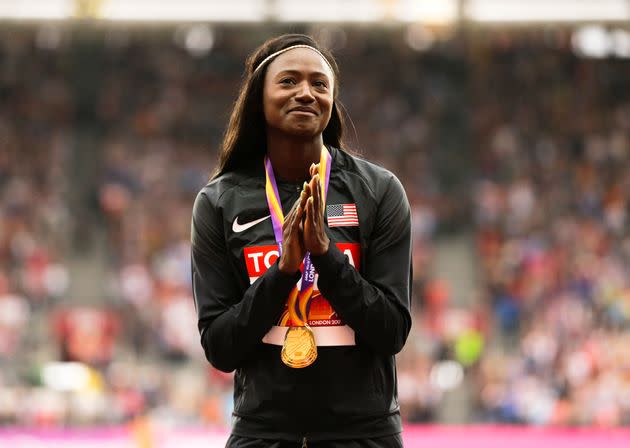Tori Bowie And The Disturbing Reality Of Rising Black Maternal Mortality

Tori Bowie, the sprinter who won three Olympic medals at the 2016 Rio de Janeiro Games, died at age 32 while in labor.
Thereleaseof track and field athlete Tori Bowie’s autopsy results earlier this week devastated not only her fans, but the Black community at large — we are far too familiar with pregnancy-related complications and even death.
The three-time Olympic medalist was found unresponsive in her home last month by authorities who were responding to a wellness check. Bowie, 32, was reportedly eight months pregnant and in labor at the time of her death; it also appeared that her family was not aware of her pregnancy. Respiratory distress and eclampsia are listed as possible complications in the autopsy, which was first obtained by USA Today.
Bowie is the latest high-profile Black woman whose pregnancy-related complications shed light on the overall traumatic experiences of Black birthing people. In a 2018 essay for Vogue, tennis star Serena Williams shared her near-death post-birthing experience. In it, she describes the hospital staff’s dismissal of her concerns over numbness in her legs after giving birth, an indication that something was terribly wrong — and it was. When insisted on further testing, her medical team resisted at first because they apparently didn’t deem it necessary. That very testing likely saved her life.
If these are the experiences of super famous and wealthy Black people, it’s fair to imagine what birthing is like for the average Black person with less money, notoriety and, in many cases, no insurance.
A few years ago, an alarming report-turned-exploratory-piece in The New York Times Magazine shed light on how Black women were dying of pregnancy-related conditions at far higher rates than their non-Black counterparts. And while maternal mortality rates have dropped as medicine modernized in developed countries such as Australia, Japan and the Netherlands, Black women continue to be disproportionately endangered in the U.S.
And I do not mince words when I tell you that if Black birthing people remain three times more likely to die during childbirth than white people, racism — both in and outside the medical system — plays a huge factor. Perhaps the wildest part is that rates have continued to rise during the past five years.
Studies also show that Black birthing people are more likely to develop preeclampsia, a condition marked by elevated blood pressure, harmful protein in the urine, headaches, shortness of breath and nausea. While serious, it can be monitored and managed through routine prenatal visits and the appropriate medical interventions to prevent the more rare pregnancy-related complication that likely killed Bowie: eclampsia.
Bowie’s story and the context of Black maternal mortality are frightening. The potential dangers of birthing are often among the first things Black birthing people consider when they learn they are pregnant. It’s also led to increased investment in Black doula programs and an interest in alternative birthing options, such as home births and birthing centers, over traditional hospital labor and delivery units.
But these problems should not be ours alone to solve. There’s been a collective push from several communities to implement systemic policies to reduce morbidity rates among Black birthing people. These policies include ensuring access to free or affordable health care to the nearly 8 million uninsured people of reproductive age.
Bowie should be here with us, celebrating her new life as a mother as well as her accomplishments as an athlete. Instead, we are mourning the loss of her incredible life in a country that can’t seem to prioritize Black people’s maternal health. We’re being robbed of our Black mothers, friends, caregivers, role models, and icons, and it’s not okay. We’re not OK.
